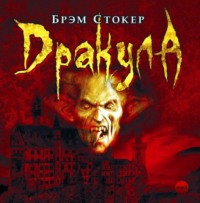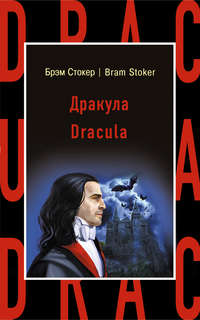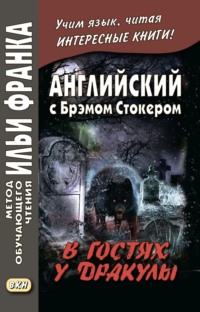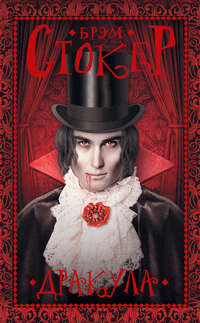
Полная версия
Дракула / Dracula
“I shall illustrate. Your friend and mine, Mr. Peter Hawkins, from under the shadow of your beautiful cathedral at Exeter, which is far from London, buys for me through your good self my place at London. Good! Now here let me say frankly, lest you should think it strange that I have sought the services of one so far off from London instead of some one resident there, that my motive was that no local interest might be served save my wish only, and as one of London residence might, perhaps, have some purpose of himself or friend to serve, I went thus afield to seek my agent, whose labours should be only to my interest. Now, suppose I, who have much of affairs, wish to ship goods, say, to Newcastle, or Durham, or Harwich, or Dover, might it not be that it could with more ease be done by consigning to one in these ports[50]?”
I answered that certainly it would be most easy, but that we solicitors had a system of agency one for the other, so that local work could be done locally on instruction from any solicitor, so that the client, simply placing himself in the hands of one man, could have his wishes carried out by him without further trouble.
“But,” said he, “I could be at liberty to direct myself. Is it not so?”
“Of course,” I replied, and “Such is often done by men of business, who do not like the whole of their affairs to be known by any one person.”
“Good!” he said, and then went on to ask about the means of making consignments and the forms to be gone through, and of all sorts of difficulties which might arise, but by forethought could be guarded against. I explained all these things to him to the best of my ability, and he certainly left me under the impression that he would have made a wonderful solicitor, for there was nothing that he did not think of or foresee. For a man who was never in the country, and who did not evidently do much in the way of business, his knowledge and acumen[51] were wonderful. When he had satisfied himself on these points of which he had spoken, and I had verified all as well as I could by the books available, he suddenly stood up and said, “Have you written since your first letter to our friend Mr. Peter Hawkins, or to any other?”
It was with some bitterness in my heart that I answered that I had not, that as yet I had not seen any opportunity of sending letters to anybody.
“Then write now, my young friend,” he said, laying a heavy hand on my shoulder, “write to our friend and to any other, and say, if it will please you, that you shall stay with me until a month from now.”
“Do you wish me to stay so long?” I asked, for my heart grew cold at the thought.
“I desire it much, nay I will take no refusal. When your master, employer, what you will, engaged that someone should come on his behalf, it was understood that my needs only were to be consulted. I have not stinted. Is it not so?”
What could I do but bow acceptance? It was Mr. Hawkins’ interest, not mine, and I had to think of him, not myself, and besides, while Count Dracula was speaking, there was that in his eyes and in his bearing which made me remember that I was a prisoner, and that if I wished it I could have no choice. The Count saw his victory in my bow, and his mastery in the trouble of my face, for he began at once to use them, but in his own smooth, resistless way.
The Count told Jonathan not to discuss in his letters things other than business. He handed him three sheets of note paper and three envelopes. So Jonathan decided to write only two formal letters, but to write fully to Mr. Hawkins in secret, and also to Mina, who knew how to read his shorthand. The Count also wrote some letters and then placed all of them together on the table and left the room. When Harker glanced at them he saw that one of the letters was directed to Samuel F. Billington, Whitby, another to Herr Leutner, Varna. The third was to Coutts & Co., London, and the fourth to Herren Klopstock & Billreuth, bankers, Buda Pesth. Then the Count returned, took all letters and said that he had much work to do. Before leaving he warned Jonathan that he should not leave his rooms because otherwise some evil things would happen to him.
Later.—I shall not fear to sleep in any place where he is not. I have placed the crucifix over the head of my bed, I imagine that my rest is thus freer from dreams, and there it shall remain.
When he left me I went to my room. After a little while, not hearing any sound, I came out and went up the stone stair to where I could look out towards the South. There was some sense of freedom in the vast expanse, inaccessible though it was to me, as compared with the narrow darkness of the courtyard. As I leaned from the window my eye was caught by something moving a storey below me, and somewhat to my left, where I imagined, from the order of the rooms, that the windows of the Count’s own room would look out. The window at which I stood was tall and deep, stone-mullioned, and though weatherworn, was still complete. But it was evidently many a day since the case had been there. I drew back behind the stonework, and looked carefully out.
Jonathan saw Dracula emerge from the window and crawl down the castle with his face down like a lizard. The sight of it filled Jonathan with disgust and fear.
15 May.—Once more I have seen the count go out in his lizard fashion. He moved downwards in a sidelong way, some hundred feet down, and a good deal to the left. He vanished into some hole or window. When his head had disappeared, I leaned out to try and see more, but without avail[52]. The distance was too great to allow a proper angle of sight. I knew he had left the castle now, and thought to use the opportunity to explore more than I had dared to do as yet. I went back to the room, and taking a lamp, tried all the doors. They were all locked, as I had expected, and the locks were comparatively new. But I went down the stone stairs to the hall where I had entered originally. I found I could pull back the bolts easily enough and unhook the great chains. But the door was locked, and the key was gone! That key must be in the Count’s room. I must watch should his door be unlocked, so that I may get it and escape. I went on to make a thorough examination of the various stairs and passages, and to try the doors that opened from them. One or two small rooms near the hall were open, but there was nothing to see in them except old furniture, dusty with age and moth-eaten. At last, however, I found one door at the top of the stairway which, though it seemed locked, gave a little under pressure. I tried it harder, and found that it was not really locked, but that the resistance came from the fact that the hinges had fallen somewhat, and the heavy door rested on the floor. Here was an opportunity which I might not have again, so I exerted myself[53], and with many efforts forced it back so that I could enter. I was now in a wing of the castle further to the right than the rooms I knew and a storey lower down. From the windows I could see that the suite of rooms lay along to the south of the castle, the windows of the end room looking out both west and south. On the latter side, as well as to the former, there was a great precipice[54] The castle was built on the corner of a great rock, so that on three sides it was quite impregnable[55], and great windows were placed here where sling, or bow, or culverin could not reach[56], and consequently light and comfort, impossible to a position which had to be guarded, were secured. To the west was a great valley, and then, rising far away, great jagged mountain fastnesses, rising peak on peak, the sheer rock studded with mountain ash and thorn, whose roots clung in cracks and crevices and crannies of the stone[57]. This was evidently the portion of the castle occupied by the ladies in bygone days, for the furniture had more an air of comfort than any I had seen.
The Count’s mysterious warning frightened Jonathan but he disobeyed it when he felt sleepy. So he fell asleep in that strange room and some dreadful things started taking place round him.
I was not alone. The room was the same, unchanged in any way since I came into it. I could see along the floor, in the brilliant moonlight, my own footsteps marked where I had disturbed the long accumulation of dust. In the moonlight opposite me were three young women, ladies by their dress and manner. I thought at the time that I must be dreaming when I saw them, they threw no shadow on the floor. They came close to me, and looked at me for some time, and then whispered together. Two were dark, and had high aquiline noses, like the Count, and great dark, piercing eyes, that seemed to be almost red when contrasted with the pale yellow moon. The other was fair, as fair as can be, with great masses of golden hair and eyes like pale sapphires. I seemed somehow to know her face, and to know it in connection with some dreamy fear, but I could not recollect at the moment how or where. All three had brilliant white teeth that shone like pearls against the ruby of their voluptuous lips. There was something about them that made me uneasy, some longing and at the same time some deadly fear. I felt in my heart a wicked, burning desire that they would kiss me with those red lips. It is not good to note this down, lest some day it should meet Mina’s eyes and cause her pain, but it is the truth. They whispered together, and then they all three laughed, such a silvery, musical laugh, but as hard as though the sound never could have come through the softness of human lips. It was like the intolerable, tingling sweetness of waterglasses when played on by a cunning hand.[58] The fair girl shook her head coquettishly, and the other two urged her on.
One said, “Go on! You are first, and we shall follow. Yours is the right to begin.”
The other added, “He is young and strong. There are kisses for us all.”
I lay quiet, looking out from under my eyelashes in an agony of delightful anticipation[59]. The fair girl advanced and bent over me till I could feel the movement of her breath upon me. Sweet it was in one sense, honey-sweet, and sent the same tingling through the nerves as her voice, but with a bitter underlying the sweet, a bitter offensiveness, as one smells in blood.
I was afraid to raise my eyelids, but looked out and saw perfectly under the lashes. The girl went on her knees, and bent over me, simply gloating[60]. There was a deliberate voluptuousness which was both thrilling and repulsive, and as she arched her neck she actually licked her lips like an animal, till I could see in the moonlight the moisture shining on the scarlet lips and on the red tongue as it lapped the white sharp teeth. Lower and lower went her head as the lips went below the range of my mouth and chin and seemed to fasten on my throat. Then she paused, and I could hear the churning sound of her tongue as it licked her teeth and lips, and I could feel the hot breath on my neck. Then the skin of my throat began to tingle as one’s flesh does when the hand that is to tickle it approaches nearer, nearer. I could feel the soft, shivering touch of the lips on the super sensitive skin of my throat, and the hard dents of two sharp teeth, just touching and pausing there. I closed my eyes in languorous ecstasy[61] and waited, waited with beating heart.
But at that instant, another sensation swept through me as quick as lightning. I was conscious of the presence of the Count, and of his being as if lapped in a storm of fury. As my eyes opened involuntarily I saw his strong hand grasp the slender neck of the fair woman and with giant’s power draw it back, the blue eyes transformed with fury, the white teeth champing with rage, and the fair cheeks blazing red with passion. But the Count! Never did I imagine such wrath and fury, even to the demons of the pit. His eyes were positively blazing. The red light in them was lurid[62], as if the flames of hell fire blazed behind them. His face was deathly pale, and the lines of it were hard like drawn wires[63]. The thick eyebrows that met over the nose now seemed like a heaving bar of white-hot metal. With a fierce sweep of his arm, he hurled the woman from him, and then motioned to the others, as though he were beating them back. It was the same imperious gesture that I had seen used to the wolves. In a voice which, though low and almost in a whisper seemed to cut through the air and then ring in the room he said,
“How dare you touch him, any of you? How dare you cast eyes on him when I had forbidden it? Back, I tell you all! This man belongs to me! Beware how you meddle with him, or you’ll have to deal with me.”
The fair girl, with a laugh of ribald coquetry[64], turned to answer him. “You yourself never loved. You never love!” On this the other women joined, and such a mirthless, hard, soulless laughter rang through the room that it almost made me faint to hear. It seemed like the pleasure of fiends.
Then the Count turned, after looking at my face attentively, and said in a soft whisper, “Yes, I too can love. You yourselves can tell it from the past. Is it not so? Well, now I promise you that when I am done with him you shall kiss him at your will. Now go! Go! I must awaken him, for there is work to be done.”
“Are we to have nothing tonight?” said one of them, with a low laugh, as she pointed to the bag which he had thrown upon the floor, and which moved as though there were some living thing within it. For answer he nodded his head. One of the women jumped forward and opened it. If my ears did not deceive me there was a gasp and a low wail, as of a half smothered child[65]. The women closed round, whilst I was aghast with horror. But as I looked, they disappeared, and with them the dreadful bag. There was no door near them, and they could not have passed me without my noticing. They simply seemed to fade into the rays of the moonlight and pass out through the window, for I could see outside the dim, shadowy forms for a moment before they entirely faded away.
Then the horror overcame me, and I sank down unconscious.
Chapter 4
Jonathan Harker’s Journal ContinuedI awoke in my own bed. If it be that I had not dreamt, the Count must have carried me here. I tried to satisfy myself on the subject, but could not arrive at any unquestionable result. To be sure, there were certain small evidences, such as that my clothes were folded and laid by in a manner which was not my habit. My watch was still unwound, and I am rigorously accustomed to wind it the last thing before going to bed, and many such details. But these things are no proof, for they may have been evidences that my mind was not as usual, and, for some cause or another, I had certainly been much upset. I must watch for proof. Of one thing I am glad. If it was that the Count carried me here and undressed me, he must have been hurried in his task, for my pockets are intact. I am sure this diary would have been a mystery to him which he would not have brooked. He would have taken or destroyed it. As I look round this room, although it has been to me so full of fear, it is now a sort of sanctuary, for nothing can be more dreadful than those awful women, who were, who are, waiting to suck my blood.
Harker wanted to look at the room in daylight but found it closed. Nevertheless he was sure that he had seen those women in reality and not in a dream. Harker realized that his life was in danger. The Count asked him to write three letters, one, dated June 12, saying that he would start for home within a few days, another, dated June 19, that he was going to leave on the next morning from the time of the letter, and the third, dated June 29, that he had left the castle and arrived at Bistritz.
28 May.—There is a chance of escape, or at any rate of being able to send word home. A band of Szgany have come to the castle, and are encamped in the courtyard. These are gipsies. I have notes of them in my book. They are peculiar to this part of the world, though allied to the ordinary gipsies all the world over. There are thousands of them in Hungary and Transylvania, who are almost outside all law. They attach themselves as a rule to some great noble or boyar, and call themselves by his name. They are fearless and without religion, save superstition, and they talk only their own varieties of the Romany tongue.
I shall write some letters home, and shall try to get them to have them posted. I have already spoken to them through my window to begin acquaintanceship. They took their hats off and made obeisance[66] and many signs, which however, I could not understand any more than I could their spoken language…
I have written the letters. Mina’s is in shorthand[67], and I simply ask Mr. Hawkins to communicate with her. To her I have explained my situation, but without the horrors which I may only surmise. It would shock and frighten her to death were I to expose my heart to her. Should the letters not carry, then the Count shall not yet know my secret or the extent of my knowledge…
I have given the letters. I threw them through the bars of my window with a gold piece, and made what signs I could to have them posted. The man who took them pressed them to his heart and bowed, and then put them in his cap. I could do no more. I stole back to the study[68], and began to read. As the Count did not come in, I have written here…
The Count has come. He sat down beside me, and said in his smoothest voice as he opened two letters, “The Szgany has given me these, of which, though I know not whence they come, I shall, of course, take care. See!”—He must have looked at it.—“One is from you, and to my friend Peter Hawkins. The other,”—here he caught sight of the strange symbols as he opened the envelope, and the dark look came into his face, and his eyes blazed wickedly,—“The other is a vile thing, an outrage upon friendship and hospitality! It is not signed. Well! So it cannot matter to us.” And he calmly held letter and envelope in the flame of the lamp till they were consumed.
Then he went on, “The letter to Hawkins, that I shall, of course send on, since it is yours. Your letters are sacred to me. Your pardon, my friend, that unknowingly I did break the seal. Will you not cover it again?” He held out the letter to me, and with a courteous bow handed me a clean envelope.
I could only redirect it and hand it to him in silence. When he went out of the room I could hear the key turn softly. A minute later I went over and tried it, and the door was locked.
When, an hour or two after, the Count came quietly into the room, his coming awakened me, for I had gone to sleep on the sofa. He was very courteous and very cheery in his manner, and seeing that I had been sleeping, he said, “So, my friend, you are tired? Get to bed. There is the surest rest. I may not have the pleasure of talk tonight, since there are many labours to me, but you will sleep, I pray.”
I passed to my room and went to bed, and, strange to say, slept without dreaming. Despair has its own calms.
31 May.—This morning when I woke I thought I would provide myself with some papers and envelopes from my bag and keep them in my pocket, so that I might write in case I should get an opportunity, but again a surprise, again a shock!
Every scrap of paper was gone, and with it all my notes, my memoranda, relating to railways and travel, my letter of credit[69], in fact all that might be useful to me were I once outside the castle. I sat and pondered[70] awhile, and then some thought occurred to me, and I made search of my portmanteau and in the wardrobe where I had placed my clothes.
The suit in which I had travelled was gone, and also my overcoat and rug. I could find no trace of them anywhere. This looked like some new scheme of villainy…
17 June.—This morning, as I was sitting on the edge of my bed cudgelling my brains[71], I heard without a crackling of whips and pounding and scraping of horses’ feet up the rocky path beyond the courtyard. With joy I hurried to the window, and saw drive into the yard two great leiter-wagons[72], each drawn by eight sturdy horses, and at the head of each pair a Slovak, with his wide hat, great nail-studded belt, dirty sheepskin, and high boots. They had also their long staves[73] in hand. I ran to the door, intending to descend and try and join them through the main hall, as I thought that way might be opened for them. Again a shock, my door was fastened on the outside.
Then I ran to the window and cried to them. They looked up at me stupidly and pointed, but just then the “hetman” of the Szgany came out, and seeing them pointing to my window, said something, at which they laughed.
Henceforth no effort of mine, no piteous cry or agonized entreaty, would make them even look at me. They resolutely turned away. The leiter-wagons contained great, square boxes, with handles of thick rope. These were evidently empty by the ease with which the Slovaks handled them, and by their resonance as they were roughly moved.
When they were all unloaded and packed in a great heap in one corner of the yard, the Slovaks were given some money by the Szgany, and spitting on it for luck[74], lazily went each to his horse’s head. Shortly afterwards, I heard the crackling of their whips die away in the distance.
Next night Jonathan saw the Count emerge from the window in his own clothes and with the bag which he had seen the women take away. It meant that the Count wanted everyone to think that Jonathan had posted his letters himself and that it was he who was to be blamed for the kidnapping of children. When a couple of hours had passed he heard some noise in the Count’s room and then there was silence. Jonathan tried the door but it was locked, so he could do nothing. He sat down and cried. Suddenly he heard an agonised cry of a woman in the courtyard. When she saw Jonathan at the window she shouted with menace to him to return her child. Then he heard the voice of the Count calling in his harsh whisper. His call seemed to be answered by the howling of wolves. In some minutes the pack of them entered the courtyard and torn the poor woman into pieces.
25 June.—No man knows till he has suffered from the night how sweet and dear to his heart and eye the morning can be. When the sun grew so high this morning that it struck the top of the great gateway opposite my window, the high spot which it touched seemed to me as if the dove from the ark had lighted there. My fear fell from me as if it had been a vaporous garment which dissolved in the warmth[75].
I must take action of some sort whilst the courage of the day is upon me. Last night one of my post-dated letters went to post, the first of that fatal series which is to blot out the very traces of my existence from the earth.
Let me not think of it. Action!
It has always been at night-time that I have been molested[76] or threatened, or in some way in danger or in fear. I have not yet seen the Count in the daylight. Can it be that he sleeps when others wake, that he may be awake whilst they sleep? If I could only get into his room! But there is no possible way. The door is always locked, no way for me.
Yes, there is a way, if one dares to take it. Where his body has gone why may not another body go? I have seen him myself crawl from his window. Why should not I imitate him, and go in by his window? The chances are desperate, but my need is more desperate still. I shall risk it. At the worst it can only be death, and a man’s death is not a calf’s, and the dreaded Hereafter may still be open to me[77]. God help me in my task! Goodbye, Mina, if I fail. Goodbye, my faithful friend and second father. Goodbye, all, and last of all Mina!
Same day, later.—I have made the effort, and God helping me, have come safely back to this room. I must put down every detail in order. I went whilst my courage was fresh straight to the window on the south side, and at once got outside on this side. The stones are big and roughly cut, and the mortar has by process of time been washed away between them. I took off my boots, and ventured out on the desperate way. I looked down once, so as to make sure that a sudden glimpse of the awful depth would not overcome me, but after that kept my eyes away from it. I know pretty well the direction and distance of the Count’s window, and made for it as well as I could, having regard to the opportunities available. I did not feel dizzy, I suppose I was too excited, and the time seemed ridiculously short till I found myself standing on the window sill and trying to raise up the sash[78]. I was filled with agitation, however, when I bent down and slid feet foremost in through the window. Then I looked around for the Count, but with surprise and gladness, made a discovery. The room was empty! It was barely furnished with odd things, which seemed to have never been used.












